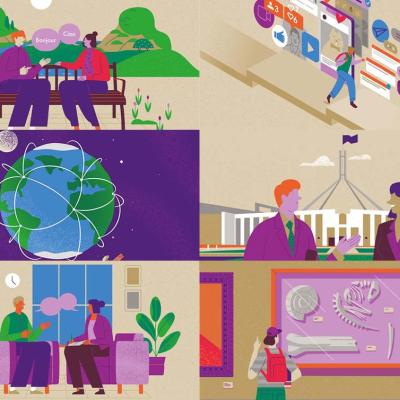So, you’re thinking about doing a Bachelor of Arts. But you kind of want to study something else as well. Good news: you might be able to do both!
One of the best things about the UQ Bachelor of Arts is that you can combine it with one of 17 other programs to graduate with 2 degrees. It’s called a dual degree, and it’s a fantastic choice for anyone who wants to keep their options open and learn a diverse range of skills.
What is a dual degree?
A dual degree is exactly what it sounds like – 2 degrees completed simultaneously. You’ll graduate with double the degrees (but without doubling your time at uni, tuition fees or workload).
There are over 70 dual programs available at UQ, 17 of which include the Bachelor of Arts.
Which programs can I pair with my Bachelor of Arts?

As of Semester 1, 2024, the degrees you can combine with a Bachelor of Arts at UQ are:
- Bachelor of Business Management
- Bachelor of Commerce
- Bachelor of Communication
- Bachelor of Computer Science
- Bachelor of Criminology and Criminal Justice
- Bachelor of Economics
- Bachelor of Education (Secondary)
- Bachelor of Engineering (Honours)
- Bachelor of Human Movement and Nutrition Sciences
- Bachelor of Information Technology
- Bachelor of Journalism
- Bachelor of Laws (Honours)
- Bachelor of Mathematics
- Bachelor of Music
- Bachelor of Science
- Bachelor of Social Science
- Bachelor of Tourism, Hospitality and Event Management
Keep in mind that you’ll need to meet the required ATAR and other entry requirements for both the Bachelor of Arts and the other program you’re interested in.
How do dual degrees work?
In a dual degree, you’ll study the core components of both the programs you’ve selected. However, you'll get to skip some of the elective courses you would usually complete in each program (in some cases, you won’t do any electives at all). This is what allows you to graduate with 2 degrees in just 4 years* of full-time study rather than 6-8 years.
*Dual degrees with the Bachelor of Laws (Honours) or Bachelor of Engineering (Honours) take slightly longer (5 and 5.5 years respectively).
Are dual degrees worth it?

Of course, you’ll want to know if a dual degree is worth it before you commit to studying one. Combining 2 programs does indeed take longer than a single degree, and it costs a little more in tuition.
However, a dual degree is significantly faster and less expensive than studying those same degrees separately. So, if the benefits of having both degrees are relevant to your aspirations, it makes sense to save both time and money by studying them together.
Worried that double the degree means double the workload? Don’t stress. Dual-degree students study the same number of courses per semester as single-degree students, so you won’t have to stay home and study while your friends are out partying (assuming you manage your time well!).
Choosing a dual degree also means you don’t have to choose between one study area that aligns with your career goals and another area that better suits your personal or academic interests. You can do both! And you might just find that your “out of curiosity” degree can lead to a fulfilling career too, if you choose to pursue it.
Once you graduate, there are two main ways a dual degree can help you:
-
Employability – Many employers regard dual degrees highly, which can give you a competitive edge in the job market. Completing 2 degrees shows your ambition and dedication to potential employers, and it also helps to illustrate your niche passions and areas of interest.
-
Adaptability – By studying 2 degrees, you’ll develop a flexible portfolio of professional skills while also getting to specialise in the field(s) that interest you. With a diverse range of capabilities, you’ll be better equipped to handle any changes and challenges that come up in your career.
Both these advantages are especially pertinent to Bachelor of Arts dual degrees. You may find your other program provides you with the specific technical skills to qualify for a specific job, while your BA helps you develop the critical thinking, creativity and problem-solving skills to stand out from other candidates. On the other hand, your Bachelor of Arts might get you a foot in the door for your dream career, while your second degree gives you the specialist expertise to carve out a unique niche in your field.
Either way, one thing is clear: double the degree means double the opportunities. The question is... which 2 programs will you choose?
Explore the UQ Bachelor of Arts Learn more about dual degrees at UQ





